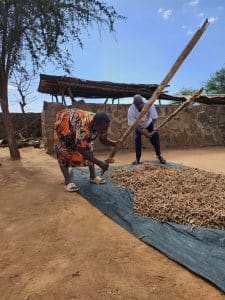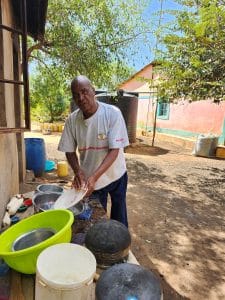“I was a boss,” said Gilbert Tanga Muasa, reflecting on his previous role within his household. “I used to work more on my own, living with my wife who would work and handle things separately.”
However, that dynamic changed after Gilbert and his wife, Christine Kaveke Tanga, participated in the Gender Model Family (GMF) training. This transformative experience encouraged them to reassess and reshape the traditional gender roles within their family.
“Things become easier for me as a head of the family,” Gilbert shared. “Chores don’t take as long to complete, and I help my wife with her tasks so everything gets done faster. Our family has found balance with things becoming easier.”

Christine and Gilbert beating their peapods.
Married for 38 years, Gilbert and Christine have built a life together in Makueni County, Kenya. They have four children and five grandchildren, and now, as a result of the GMF process, they share duties more equitably, creating a harmonious and collaborative household. In October 2023, Gilbert and Christine were among 20 families in Kenya selected to take GMF training. This two-day training session followed by ongoing monitoring and support is offered by CDF Canada’s VOICE for Women and Girls Program (VOICE). The initiative aims to challenge and redefine traditional power dynamics and decision-making in households. By questioning conventional gender roles and duties, the training empowers families to become role models for progressive gender dynamics within their communities as they implement what they’ve learned within their homes.
However, this shift was not without its challenges. Christine recalled having to persuade Gilbert that the changes were beneficial and they needed to practice what they had learned. Despite initial resistance, the couple has since embraced their new roles.
“We now share responsibilities, including raising our children,” Gilbert said, noting that even their adult sons have adopted these changes after witnessing the positive impact on their parents’ relationship. “They started coming home regularly because of the togetherness we’ve built as a family. Before they would stay away for months or years.”
Extended family has also taken an interest in the new household dynamics. In June, Gilbert and Christine hosted two family meetings to share their experiences and encourage their extended family members to adopt similar practices.
“We wanted everyone to learn and involve their kids in family decisions,” Gilbert explained.
Financial decisions in the household have also evolved. Christine now manages the family’s domestic animals – cows, chickens, goats, and sheep – and oversees the finances generated from these assets. With this income, she is able to cover school fees for her grandchildren and meet other household expenses. The community has taken notice of the transformation in Gilbert and Christine’s household. She is frequently approached by other women who want to learn how to implement similar changes in their own homes and farms.
“It makes me feel so good” Christine said, noting that these women are eager to take these lessons back to their families. Gilbert added that even local husbands have come to him for advice on how to foster similar developments within their own families.
“People are interested in how we’ve involved everyone in our agricultural activities. At first, they thought it was strange, but now they’re borrowing ideas from us.”
Friends and neighbors now see Gilbert and Christine’s household as an organized, harmonious family that works together and avoids conflicts. However, not everyone in the community is supportive of these changes.
“There are still some who resist the shift in gender dynamics, and that remains a challenge,” Gilbert acknowledged.
As Gilbert approaches his retirement from teaching in March 2025, he looks forward to dedicating more time to his family and their shared work.
“I will be at home so I will have more time to do my work and to improve my family,” he said.

Gilbert washing dishes.
Through VOICE, Gilbert and Christine will continue to engage with other families and co-operatives, sharing the beliefs, actions, and outcomes that have transformed their household into a model for gender equity.
Gender Model Family
As part of CDF Canada’s approaches towards gender transformation, the Gender Model Family (GMF) approach is incorporated to address gender inequalities at both the household and community levels by promoting equitable division of unpaid work. It begins with training on basic gender concepts to build an understanding of the unequal distribution of care work between men and women. After the initial training sessions on gender awareness, participants assess the division of domestic chores in their own household and compare the daily activity profiles of women and men. They then work together to devise a household action plan that assigns chores in a more equitable way. As both men and women contribute to household work, they have time to engage in other income-generating activities and have more free time to enjoy as a family. This involves a series of trainings and follow-up sessions.
To date, the approach has brought on positive outcomes for project participants, in terms of more gender-equitable family dynamics and overall community cohesiveness. Along with CDF Canada’s co-operative development approaches that create an enabling environment for Women’s Economic Empowerment, the GMF approach is fostering social transformations that allow women to develop their professional skills and excel as entrepreneurs, all with the help and support of their husbands and male family members.